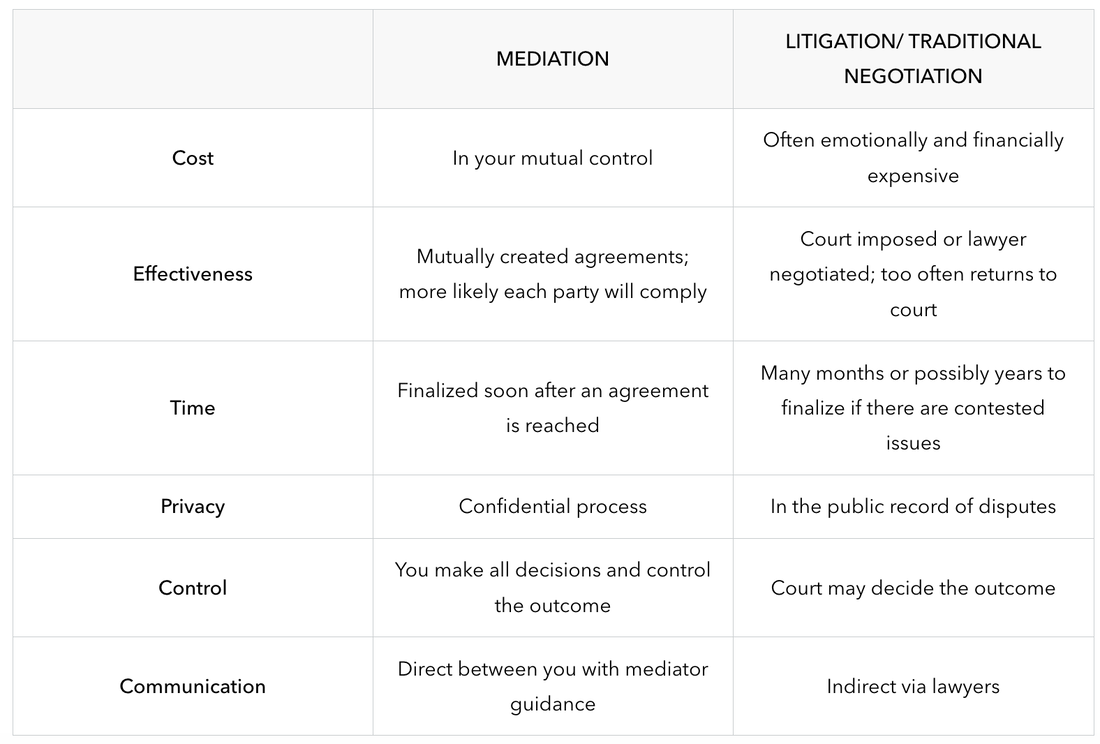|
You have decided to divorce; now what? The first question to ask yourself is, “What process is the best fit for you and your family?” The process you choose will impact cost, conflict, and timing as well as your family and financial future. To make the best decision, you need professional education to be certain you understand all of your options before you begin. Here, we’ll go over the most common types of divorce and why the mediation process might be the best option for you. What Are the Different Divorce Options?The family transition in separation or divorce can challenge you emotionally and financially. The first question to ask yourself is “What process is the best fit for you and your family?” What Is a Pro Se Divorce?In a pro se divorce, the parties are self-represented and do not hire lawyers. This means that parties must make decisions, draft, and file all the required legal documents and financial disclosures on their own behalf. Although a pro se divorce may initially seem like a more affordable option, navigating the divorce process without any legal input can result in mistakes and uninformed decisions, court rejection of an agreement, or future disputes and returns to court. Because of this, a pro se divorce can actually become more expensive and complicated than other divorce options. What Is a Collaborative Divorce?Collaborative divorce is the process in which each party hires a lawyer and all four work together in a cooperative, non-adversarial, out-of-court process with the mutual goal of reaching an agreement. A team approach with direct client participation is used for educating, negotiating, and reaching agreements; the team may also include child or financial specialists. Each party commits not to go to court for decisions, and collaborative lawyers are disqualified from participating in contested court hearings. What Is Divorce Litigation?Divorce litigation, or lawyer negotiation, is the traditional adversarial divorce process in which one or both parties hire an attorney who advocates for that client’s position. Attorneys negotiate, but if an agreement on all issues is not reached, the judge conducts a court trial and makes final decisions. Divorce arbitration is similar to litigation except decisions are made by a hired arbitrator rather than a judge. Even though most litigated divorces are ultimately resolved by a settlement between the parties, it can be a lengthy process that is emotionally and financially expensive. What Is Limited Scope Representation?Limited scope representation, also referred to as consulting services, is an option for a party to hire a lawyer to provide advice, document review, drafting, or other specified services. This allows a party to pay only for limited legal assistance rather than full representation. Consulting and limited scope representation help lower costs while also avoiding the risks that come with a pro se or self-represented divorce. When considering limited scope representation, it is essential for parties to discuss and agree upon the specific tasks to be performed with their attorneys before beginning services. What Is Divorce Mediation?Divorce mediation is a process in which parties hire a neutral lawyer who works with the couple jointly but does not represent or advocate for either party. The lawyer mediator educates the parties about the law, guides discussions to help them resolve issues, and drafts and files legal documents. The goal of mediation is to help parties reach durable agreements that meet the needs of their family. Mediation may include child and financial specialists if needed to assist the parties in making well-informed family and financial decisions. Why Choose Divorce Mediation?Divorce is more than a legal problem; it affects every aspect of your life. Too many families spend time and money in courtrooms fighting. At Family Mediation Center, we will help you choose a healthy path to address your financial, emotional, and legal concerns as you create the necessary legal documents and move forward. To help better illustrate the benefits of the divorce mediation process, here is a side-by-side comparison of mediation and traditional litigation.
Contact the Family Mediation Center TodayThe Family Mediation Center's process is designed to minimize cost and conflict. To schedule a no-charge phone consultation with a lawyer mediator or to receive more information about our mediation process, please call us at 414-939-6707 or contact us online. All inquiries are confidential. |
|
Family Mediation Center main office is conveniently situated in the Third Ward. 126 N. Jefferson St., Suite 200, Milwaukee, WI 53202.
Please call 414-939-6707 if you have any questions. © 2024. Family Mediation Center. All Rights Reserved. This website is for informational purposes only. Nothing herein provides any legal advice or creates a lawyer-client or mediator-client relationship.
Website by RyTech, LLC
|



 RSS Feed
RSS Feed
